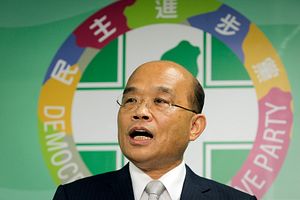The new concept for cross-strait relations, “China plus one,” proposed by Su Tseng-chang, who chairs Taiwan’s largest opposition party, the Democratic Progressive Party (DPP), suggests that Taiwan might have taken another step towards comprehensive integration with China.
In losing the presidential election in January 14, 2012, the DPP clearly felt the significance of the China factor. It needs to ameliorate relations with Beijing if it is to do better in future elections, but its pro-independence principle – a key part of the party’s appeal for many voters – would seem to be a major obstacle. Established by political dissidents in 1986 while Taiwan was under martial law, the DPP was an indispensable actor in Taiwan’s democratization and its flag, Taiwan in the white cross, somewhat represented its final goal of the de jure independence of Taiwan.
However, the DPP would need to relinquish its goal of Taiwanese independence, anathema for Beijing, if it is to achieve the kind of rapprochement and cooperation which the Chinese Nationalist Party (the Kuomintang, or KMT) now enjoys with China. In fact, the DPP has attempted to reach a compromise between the expectations of the majority of its supporters and the demands of China through a number of initiatives, such as visits by key party officials to China and interpersonal dialogues at academic conferences. “China plus one” would appear to be the latest incarnation of these efforts following a series of internal discussions about its new China policy.
Although the Resolution on Taiwan’s Future, the most salient DPP document highlighting independence, has not been forsaken, Su has downplayed it and described it as a part of the past. In contrast, “China plus one” connotes a sense of belonging. Normally, the policy of a sovereign state or an intergovernmental organization would be centered on itself, after all it is “ASEAN plus one,” and not “China plus ten.” Not surprisingly, Beijing is still unimpressed, given that the DPP has not formally removed independence from its principles. Nonetheless, the DPP’s dramatic shift in position along the political spectrum does suggest a smoother integration across the Taiwan Strait.
Since the China-friendly president, Ma Ying-jeou, took office in 2008, his series of open policies and Beijing’s positive responses have accelerated cross-strait integration in almost every sector. This has given China new leverage, direct and indirect, over Taiwan’s domestic affairs, in addition to those it has gained from Taiwanese trade and investment since the late 1980s. As early as 2006, a Chinese scholar described Taiwan’s economic reliance on China as “diabetes.” This leverage helped Ma win a second term on the strengths of concerns among economy-minded voters about China’s reaction to a Ma loss. With the upcoming arrangements under the Economic Cooperation Framework Agreement (ECFA), such as the Cross-Strait Service Trade Agreement, China’s influence in Taiwan will grow even greater. This political and economic pressure, which has forced DPP decision makers to farewell the party’s traditional doctrine underscores the new political reality in Taiwan. Although the DPP will find it tough to match the KMT in terms of its relations with Beijing, “China plus one” seems to confirm its resolve. As long as competitive elections are still held in Taiwan and China plays a critical role, winning China’s favor could emerge as one of the main contests between the KMT and the DPP. Consequently, further cross-strait integration will be easier to get through the Legislative Yuan, with the largest opposition party not daring to oppose it.
Although the post of DPP chairperson will be up for grabs in an election to be held this year, political and economic circumstances in Taiwan will leave any new leader little scope to return to the party’s original pro-independence doctrine. If winning future elections is the DPP’s priority, it must realize that it does not have the votes and it needs to build popularity. Of course, pro-independence voters may gradually stop supporting the DPP out of disappointment and shift their allegiance to other pro-independence parties, such as the Taiwan Solidarity Union (TSU), but for now at least it looks unlikely that another party is going to rise to the same level of prominence the DPP has achieved. Even if the TSU or another pro-independence party is able to eventually supplant the DPP in its traditional role, it is doubtful it would be able to challenge the institutionalized cross-strait integration set to be in evidence in a few years, especially as China’s leverage will only grow. In other words, despite the high percentage (more than 50 percent in several recent polls) of Taiwanese who prefer independence, public opinion does not look able to derail integration. The trend towards cross-strait integration does not guarantee ultimate de jure unification in the near future, but Taiwan’s de facto merger into China certainly creates strong conditions for such an outcome.
Accompanying this trend toward cross-strait integration is the growing likelihood that political leaders in Taiwan will cooperate with China’s policy. Taipei’s immediate and positive response to Beijing’s East China Sea Air Defense Identification Zone (ADIZ) is a recent example. With China able to exert this kind of leverage over Taiwan, the potential for the use of force recedes. And while U.S. has been a significant player in Taiwan through political and economic tools since 1945, a peaceful settlement of Taiwan issue would seem to be in the U.S. national interest. At any rate, peaceful integration permitted by a democratically government leaves Washington without a legitimate option to intervene. Inasmuch as the U.S. does not get involved, other regional powers, such as Japan, very likely have the most to worry about with the changes in Taiwan.
Shang-su Wu is a research fellow in the Military Studies Programme, a constitute unit of the S. Rajaratnam School of International Studies (RSIS), Nanyang Technological University, Singapore.

































